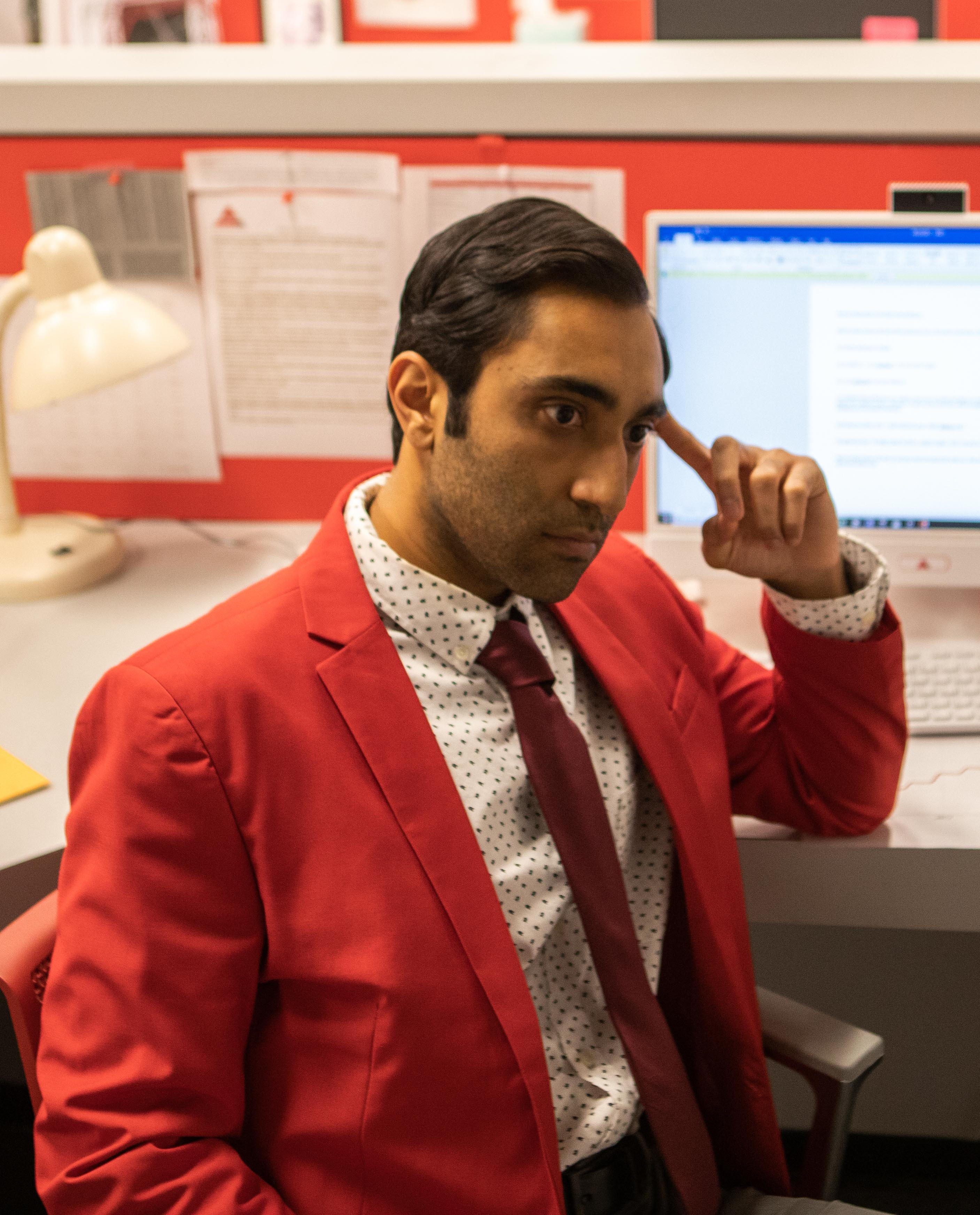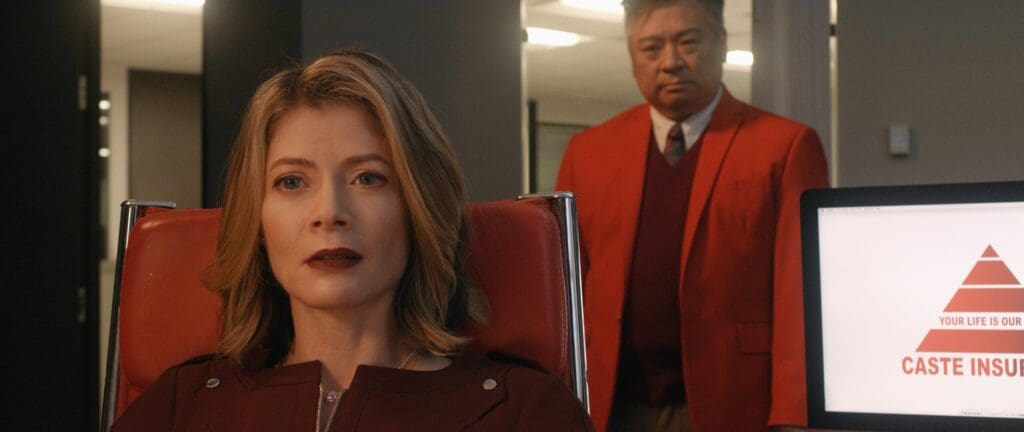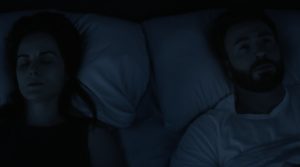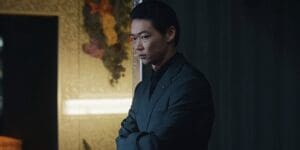Like many horror comedies, Keeping Company pokes a gnarly finger at some serious topics (such as greed and capitalism) in an entertaining and colourful way. A few days ago, I spent an equally entertaining half hour talking to the film’s writer/director Josh Wallace and writer/producer Devin Das, prior to the European premiere at Grimmfest’s Easter Horror Nights.
“We’re really excited about that” Devin told me. “With Grimmfest putting on this smaller, Easter event, it feels like it could give our little film a pretty good chance of being seen. And we also think the darker end of our humour is well suited for places like the UK and Europe.” It certainly fits in well with the programme’s variety.
I half expected to see them both in red jackets, like the insurance salesmen in the film. Wouldn’t it be fun to turn up like that, say in a Q&A at the festival? “We actually already did,” said Devin “and everyone showed up in red, and I thought I was wearing red, but it was a dark maroon, almost purple.” Josh added “we’ve been sitting with this film for quite a while now though, and a bit sick of seeing the red. I think we could do with that colour out of our lives now.”

So the pair told me a little bit about themselves, and how they got working together. Josh started: “Devin and I have been in Hollywood for close to a decade. We kind of worked our way up in the studio world, where we were assistants for two comedy directors. That’s how we met: our bosses ended up working together. And we started writing together for four or five years, and haven’t had much success in getting scripts made, so we just decided to make it ourselves. That’s how Keeping Company came to be. It’s a story of struggle.”
Devin added to the story: “I think for both of us, this is our first feature, but we came to it fully prepared. We both – separately and together – worked on a lot of short form material. We’d always kind of struggled with the aspects of sending scripts round and getting people to greenlight it, so for us, we kind of came to a point in our writing career where it made sense to just make it happen: we do short stuff all the time, so why not a longer one? We can figure it out.”
Clearly a common outlook, so I asked what the writing partnership was like. “A lot of it – due to work schedules and so on – was like ping pong,” said Devin. “I’d write something, do some revisions, send it over to Josh; then he’d do the same, we’d hop on the phone and talk about it. But when we got serious we’d get together every day and just hash things out, and write. And it was just the best version of writing for us.”
“This script was very much like a studio buddy comedy at first,” said Josh, “which you can probably still see in there in Sonny and Noah. But as we kept writing, we kept finding more of those darker themes which started to stick out, and we began to gravitate towards those and explore.”
I asked what the inspiration is for that humour. “Devin and I come from the comedy world” said Josh, “so we would always look through that lens. As for the film, we tend to look to influences like the Coen brothers’ films like Fargo, Burn After Reading and so on; the bombastic characters and worlds. This was something we wanted to emulate, as such characters would be ideal to communicate our themes.”
“In terms of the comedy aspects,” said Devin “people like Richard Ayoade, Jesse Armstrong and Matt Berry… actually whenever I watch Channel 4 stuff, I think this style would never live in the USA because our audiences don’t take to the darker humour that British comedians take to the table, especially when they play with absurdity so well. For me, having watched so much of the British comedy leading up to this, I knew I could balance this tone, because I’d seen it happen.”
I’d read the “director statement” in which Josh had declared the film to be about the worst in people, but I had to ask: do they have something against salespeople? “Sales was the appropriate place to talk about how society is set up and the way corporations are set up, and how we’re all driven by our jobs, going higher up the food chain and all that. Sales made sense in that context, and those can be some of the most ruthless people: at the end of the day, it’s all about the sale. If there are any salespeople out there, I’m sure you’re good human beings, but it’s inherently something that feels a little icky, I guess.”
“I think it’s so funny,” says Devin, “because literally we took salesmen and the sales route to tell our story, but we wanted it to be allegorical about the systems we have in place. And that was a big thing, because these guys are going out there trying to sell people what they don’t need, and we’re all being sold stuff we don’t need every day. It was also the pressure in the company to be as productive as possible; otherwise, you’re going to get cut. The idea of utilizing people that are lower down than them in the class system to profit from their labor, or quite literally them as people. It was all meant to help us showcase these great ideas, but it was also understandable to use salesmen because they can be you know, not the most pleasant people sometimes. But we don’t have anything personal against them: we’ve both done sales jobs, but we both sucked at it, so maybe we’re a bit bitter about our lack of sales skills.”
Considering the nasty pair of women in Keeping Company, I wondered if they had also both had female bosses. “No, that was actually something we talked about a lot,” said Devin. “The CEO is traditionally a white man in stories like this. But we’d had the horror trope of the grandma we were playing with, and we wanted that parallel of who they are in society; not as women, but as people at the top of their food chain. We had conversations about whether the two would work well as contrast, even visually.”
Most of what I had paid attention to in the film was around the characters, and one who stood out (partly because he was driven on his own, rather than within a pair) was Sonny’s father. I asked whether he was based on one of their own parents. “Well, in a sense,” said Devin. “I brought my father and his father’s relationship to the table: that was a huge inspiration. We were trying to humanise Sonny’s character to a degree, so that – at least at first – people can latch onto him without completely writing him off, because he’s such a despicable character, especially looking at the way he evolves. So we felt we had to give him this father character, and then I brought in my personal influences, and then the cultural aspect – from many cultures – where there is a pressure to move upwards and hit a certain mark socially. We figured people would relate to that.”
Josh added “also the generational thing was important to us, just to show the difference between Lucas and grandma, Sonny and his dad: you get the feeling that one generation is speaking to another. We looked out at the world and what we saw was a class system that’s creating gaps between people, a political system that does that, and also a generational system too. All these things pit people against each other, and there are ideologies that older generations try to place on the younger generation. Sometimes that can be a good thing, but in our film, let’s say it’s a bad thing.”
So they have sales experiences, world and family experiences to draw from, but I doubt these writers had ever been locked up in a basement like their central characters. I wondered how they would react in that situation. Devin was stumped at first: “That’s a really good question; I’ll need to think about that. In reality, most people’s instincts would be fight or flight. If I were literally held captive, I guess I’d try to talk myself out of it at some point: what else could you do?”
Here, Josh differed: “They’re feeding us, so I’d probably stay.”

Laughter broke up the conversation for a bit, but Devin went back to analyzing. “Those two characters are kind of the extreme ends of the spectrum, but I personally see myself in both of them. I feel like I’d probably try to strike a balance between the two: you can’t be completely naïve, nor completely pragmatic. Actually, I’d also hope that I’d have people come looking for me.”
Sonny and Noah had an interesting relationship: one said they were friends, the other denied this and insisted they were co-workers. “For us, we were trying to strike the balance,” said Devin. “If they were really friends, that could make Sonny way more unlikeable and way less understandable; so we really whittled away at that and determined that one of them would be clearly in his own lane and attaching himself to the other person.”
It was interesting to discuss a little what-if: if both of the salesmen had made it to the end of the film, might they have become better friends? Josh answered this point: “Our intention was that Sonny was always going to be who he was. He started off on a different page to Noah, and he was never going to get on the same page; would always see him as a co-worker, because he only cared about moving up, and playing into the system. So for us, there could never be hope for them: it’s great to be hopeful but you can’t just have hope with blinders on.”
“What really helped us” added Devin, “was that all of the characters evolve, but they are all one-track. They don’t have a real arc, stuck in their ways, except for Lucas: he’s the one person who does evolve with a true arc, which is why we consider him our true protagonist.”
I asked what Josh and Devin are working on next. Devin answered first: “Josh has written something that I’m producing, so working together again there. And we also have some other ideas that need to get onto pages. Pretty much everything will be in the same tonal balance of comedy and genre.”
Josh expanded a little: “This next one is going to be a bit more commercial, perhaps. Then beyond that we have other ideas because we really liked the way things worked out with Keeping Company: we used that to put forward ideas, themes and our view of the world through a story. If we can write about how we see the world, dog-eat-dog, that leads to more interesting things that you might not see in other movies, and things that might make the audience question if they would have done it that way. But you do it ‘that way’ because that’s how you get to something unique.”
This sounded like a pessimistic worldview. “I don’t think we’re pessimistic,” said Josh. “It takes an acknowledgment of the way the situation is: people who are on top are most likely going to win their game every single time, and everyone else gets screwed. If we want change, we have to acknowledge that’s the system, and then we can change the system. Change can happen, but it takes that acknowledgment first.”
“Right,” said Devin. “We didn’t put forward a tonne of solutions, but we do believe there is hope, there are solutions. Like Noah says in the film, it’s about working together, but it’s going to take the best of both: working together and being uncompromising. The film may be a reflection of the worst in the world, but there are good guys here too; they just need others to work with them.”
Keeping Company was finished and heading for the festival circuit before the pandemic arrived; I asked them to tell me what life had been like since then. “It’s hard to say what would have ended up happening for the film if the pandemic had not happened,” said Devin. “We were so independent when it came to post-production, we had to keep looking for money to get it across the finish line, and it might have taken us the whole of 2020 pandemic or not. It’s about finding and stretching every dollar as far as we could. Ultimately the pandemic might have helped us stretch that dollar because people were more available to work. We had time, and very little money; our sound engineer and others had time and were willing to work for very little money, so it might have worked in our favor a little.”
Josh came in “We’re lucky that we got this finished before the pandemic happened because I know a lot of productions – especially at indie level – that had to face shutting down production, and that’s tough. It’s so nice now that it feels like we’re coming out of it. Now we can all be Noahs and enjoy some hope.”



